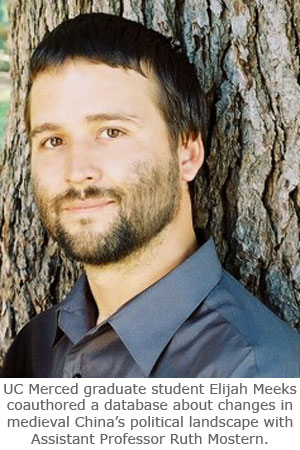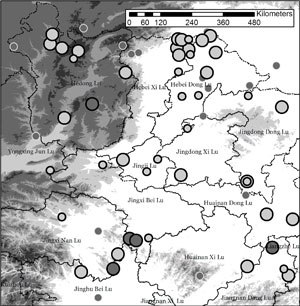

Two years of coding a computer database paid off for graduate student Elijah Meeks when the finished project landed him a job at Stanford University.
Meeks paired his knowledge of history with a deep understanding of computer language to create ”
The Digital Gazetteer of the Song Dynasty,” a database coauthored with Assistant Professor
Ruth Mosternthat chronicles changes to medieval China’s political landscape. It also serves as a companion piece to Mostern’s book “Dividing the Realm in Order to Govern: The Spatial Organization of the Song State (960-1276 CE).” The book will be published in fall 2010 by Harvard Asia Center.
The finished database helped to secure Meeks a job two months ago with Stanford University as a digital humanities specialist.
UC Merced’s emphasis on interdisciplinary research allowed Meeks and Mostern to collaborate on this innovative project through the
World Cultures Graduate Group. They were able to query and analyze the data in order to create maps to highlight events that altered the course of history.
“I love all this stuff,” he said. “I’m a terrible nerd.”
Meeks did his undergraduate studies at University of San Francisco. He graduated with a 3.9 GPA and honors. Meeks, who grew up in Exeter, a small town just outside Sequoia National Park, decided it was important to return to the San Joaquin Valley and support UC Merced.

This map depicts all of the counties and prefectures that were established or abolished in North China between the founding of the regime and the Song-Tangut war in 1040.
The database opened opportunities for Meeks, who said it was instrumental in Stanford’s decision to hire him while he finishes work on his Ph.D. Besides meeting with the publisher of the Stanford University Press, Meeks gave an hour-long presentation on the database. The interview committee was impressed that the database was completed and able to be accessed by researchers through UC Merced’s online library.
“You can box it up, put a bow on it and send it off,” he said, referring to how the project is finished and portable.
Mostern said Meeks’ job speaks to his talents and the value of the database.
“I’m proud of this on so many levels,” she said. “It is blazing a new path for academic conversation.”
That conversation will expand across the world. The digital assets division of
UC Merced Libraryis hosting the database online, said division head Emily Lin. In the coming months, it will be added to UC Merced’s catalog and to WorldCat, a searchable site of more than 10,000 libraries.
“We see more and more faculty making their research available online,” Lin said. “It’s important for us to think about collecting and preserving it for the longer term.”






